Categories: News
Date: August 2nd, 2022
Carmunication Website Relaunch
Summary
How AI helps self-driving cars perceive objects
In the not too distant future, autonomous cars will conquer our streets and have to find their way between pedestrians, cyclists, buses and trains. The navigability of such autonomous vehicles in urban environments using, for example, 2-D or 3-D maps and corresponding sensor technology is already impressive today. But there is still a long way to go to safe and ethical locomotion (see Autonomous driving: Algorithm address ethical issues).
Artificial intelligence (AI) processes and methods are nevertheless the key to autonomous driving. So far, the algorithms of autonomous vehicles still lack robustness. In addition to ethical considerations, accurate recognition and visual interpretation of the situation plays an equally important role, especially in navigating safely between other vehicles and also pedestrians in unfamiliar urban environments.
Using Deep Learning to understand the scene
Deep learning is a special form and a subarea of machine learning based on artificial neural networks. This tool can be used to process complex data such as images or texts.
The task “scene understanding” can be solved with Deep Learning, a sub-discipline of machine learning.
On the way to human-like perception
Another milestone on the way to human-like perception for self-driving cars is the so-called amodal panoptic segmentation task. Until now, robots or autonomous vehicles have been limited to modal perception, which limits their ability to mimic the visual experience of humans. With advanced AIAI – artificial intelligence More algorithms, visual recognition capability for self-driving cars could now be revolutionised. Machines will learn to abstract from the partial occlusion of objects and recognise them in their entirety.
Details
1) Turning car and user data into a personalized repair and maintenance plan |
|
| Personalized Repair Assistant The Personalized Repair Assistant manages the entire customer experience, providing predictive maintenance recommendations based on user data, but also locating workshops, scheduling appointments, and organizing alternative mobility. With increasing electrification and fleet growth, the service prevents breakdowns, facilitates coordination efforts and ensures cost savings. Collaboration among Carmunication members enables comprehensive end-to-end solutions that include detection, software, data and field maintenance. |
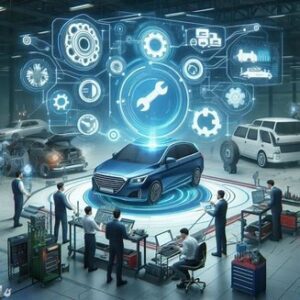 |
2) Creating a brand independent app store via virtual sandbox
|
|
| Sandbox for Individual Features The Sandbox promotes third-party application development on a brand-agnostic vehicle platform for B2B and B2C vehicles. As the complexity of in-vehicle software increases, the Sandbox reduces development costs by providing a standardized, brand-independent developer experience. This also offers OEMs a ‘safe space’, by enabling them to gradually open their APIs. Carmunication members need to explore the technical feasibility and required permissions for seamless integration into the infotainment. |
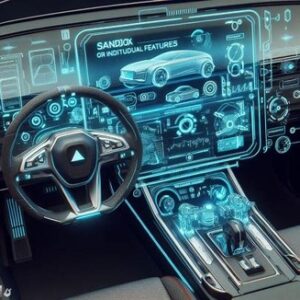 |
3) Optimizing fleet operating costs and availability with 360 Future Fleet |
|
| 360 Future Fleet 360 Future Fleet is an end-to-end, data-driven fleet management solution for fleet operators. It reduces operating costs and increases fleet uptime through connectivity, analytics and seamless integration with third-party fleet service providers. Carmunication members can integrate their expertise in dongles, connectivity and workshop networks to systematically service the growing number of fleet vehicles. |
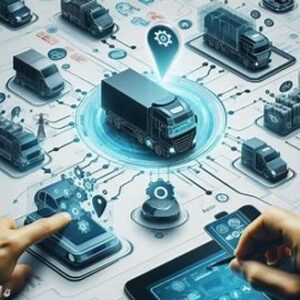 |
4) Creating an attractive and future-proof independent aftermarket education program |
|
| Education Program The training program aims to make jobs in the aftermarket more attractive and to respond to changing skill demands. As part of the program, trainees rotate between Carmunication and external organizations and share insights at regular meetings and on online platforms to adapt to new market demands (software, data, electrification). The diverse expertise of Carmunication’s members allows for a practical design of the program and effective integration into the current apprenticeship structure. |
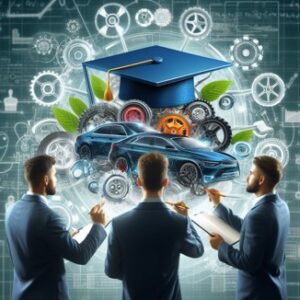 |
5) Fostering development and implementation through a joint Data Solution Lab |
|
| Data Solution Lab The Data Solution Lab is a joint platform for the development and commercialization of data and software services. Through a collaborative approach, the Data Solution Lab mitigates the financial risk for individual Carmunication members. By providing a structured view of vehicle data, it enables Carmunication members to collaborate on new service ideas and integrate them into market-ready offerings. The platform provides support for technical issues and for establishing the right working mode between members. |
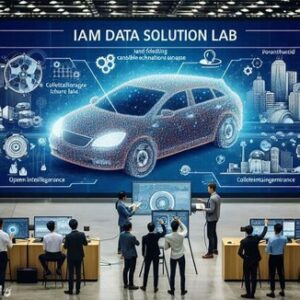 |
6) Providing a unified access to vehicle data via a VIN Platform |
|
| VIN Platform Powered by data from independent repair shops, the VIN Platform provides VIN-based static/dynamic data sets (e.g., breakdowns, mileage, spare parts, etc.) for monetization. As the complexity of vehicle data increases, the platform defends against market exclusion by OEMs, allowing members to monetize their data assets. Carmunication members and partners can work together to feed data into the platform, but also pursue their own implementation and monetization options. |
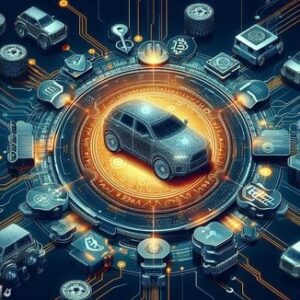 |
7) Ensuring reliable vehicle service history trough Blockchain “trusted” workshops |
|
| Blockchain „trusted“ workshops Independent repair shops can record changes and modifications (e.g., part change, regular maintenance, etc.) to the car on a tamper-proof blockchain, helping to make used car pricing more accurate. Certifications capture authenticity and reliability, critical for integrating vehicles into Second Life applications. Communication members can either implement (one or more) existing blockchain solutions, or develop a new one specifically for the needs of the independent aftermarket. |
 |
8) Maximizing EV batteries value with Battery Residual Value & Maintenance Cost Forecaster |
|
| Battery Residual Value & Maintenance Cost Forecaster The Battery Residual Value & Maintenance Cost Forecaster helps fleet operators, OEMs and individual drivers predict the residual value and associated maintenance costs of the EV battery. Based on robust depreciation models for different battery types, recommendations are provided on when to resell at the perfect price point. Carmunication members can use their exclusive access to EVs and their battery usage/break-down data to build bottom-up depreciation models. |
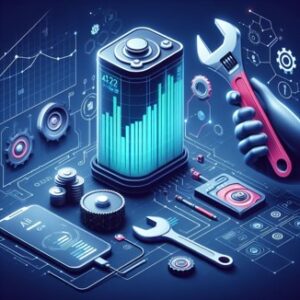 |
9) Providing the right software update for all vehicles via a software catalog |
|
| Software Catalog The Software Catalog provides the right software update for each vehicle based on its VIN number. Today, there is a wide variety of makes, models and software platforms available, making a vehicle software update complex (which update fits which model?). Carmunication members use the catalog to provide clarity on model update compatibility, especially for safety-critical components that need to be updated in the shop. |
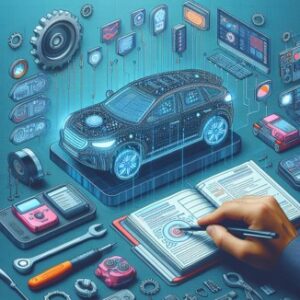 |
10) Providing cost-effective access to calibration equipment with the Autonomous Driving & ADASADAS – Advanced Driver Assistance System – supports the driver with the handling of the automotive. They are often used to increase the safety, efficiency or the comfort of the ride. The systems use sensors to record the driving situation, process the collected information with the aid of computer technology and provide the driver with visual, acoustic or haptic feedback. In some cases, they intervene autonomously or semi-autonomously in the control and operation of the vehicle, for example by operating the accelerator, brake, signaling or steering. This can extend all the way to fully autonom… More Calibration Hub |
|
| Autonomous Driving & ADASADAS – Advanced Driver Assistance System – supports the driver with the handling of the automotive. They are often used to increase the safety, efficiency or the comfort of the ride. The systems use sensors to record the driving situation, process the collected information with the aid of computer technology and provide the driver with visual, acoustic or haptic feedback. In some cases, they intervene autonomously or semi-autonomously in the control and operation of the vehicle, for example by operating the accelerator, brake, signaling or steering. This can extend all the way to fully autonom… More Calibration Hub The Autonomous Driving & ADASADAS – Advanced Driver Assistance System – supports the driver with the handling of the automotive. They are often used to increase the safety, efficiency or the comfort of the ride. The systems use sensors to record the driving situation, process the collected information with the aid of computer technology and provide the driver with visual, acoustic or haptic feedback. In some cases, they intervene autonomously or semi-autonomously in the control and operation of the vehicle, for example by operating the accelerator, brake, signaling or steering. This can extend all the way to fully autonom… More Calibration Hub provides cost-effective access to specialized equipment and training to perform sensor calibration services on highly automated vehicles. As the number of in-vehicle sensors supporting automated driving increases, so does the need for accurate calibration. Carmunication members can help shops rent calibration equipment, mitigate high costs and meet certification requirements. |
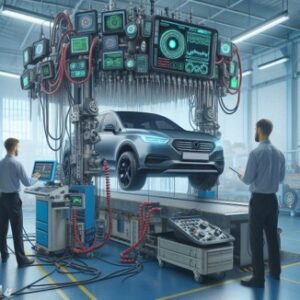 |
Sources

Written by Carmupedia Editorial Office
You might also be interested in
Unveiled by Handelsblatt, a massive Tesla leak suggests a potential cover-up of far-reaching Autopilot safety concerns and customer complaints.
In a significant development for the automotive industry, Paul Whytock, a former design engineer at Ford Motor Company, reports a shift from the traditional programming languages C and C++ to Rust in automotive software.
Honda Motor Co. and South Korean battery maker LG Energy Solution said they will invest $4.4 billion to build lithium ion batteries in the U.S
Protocol to the Advisery Board meeting 25.10.2022.